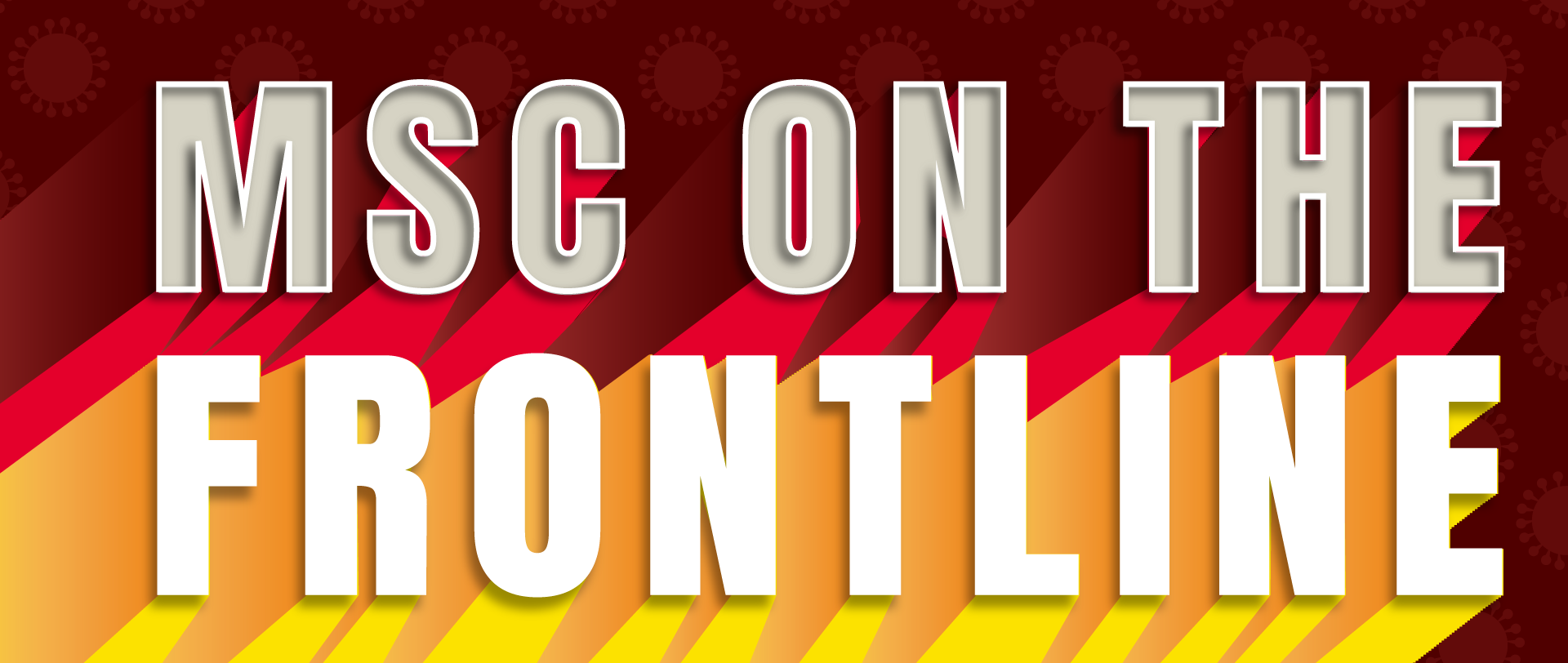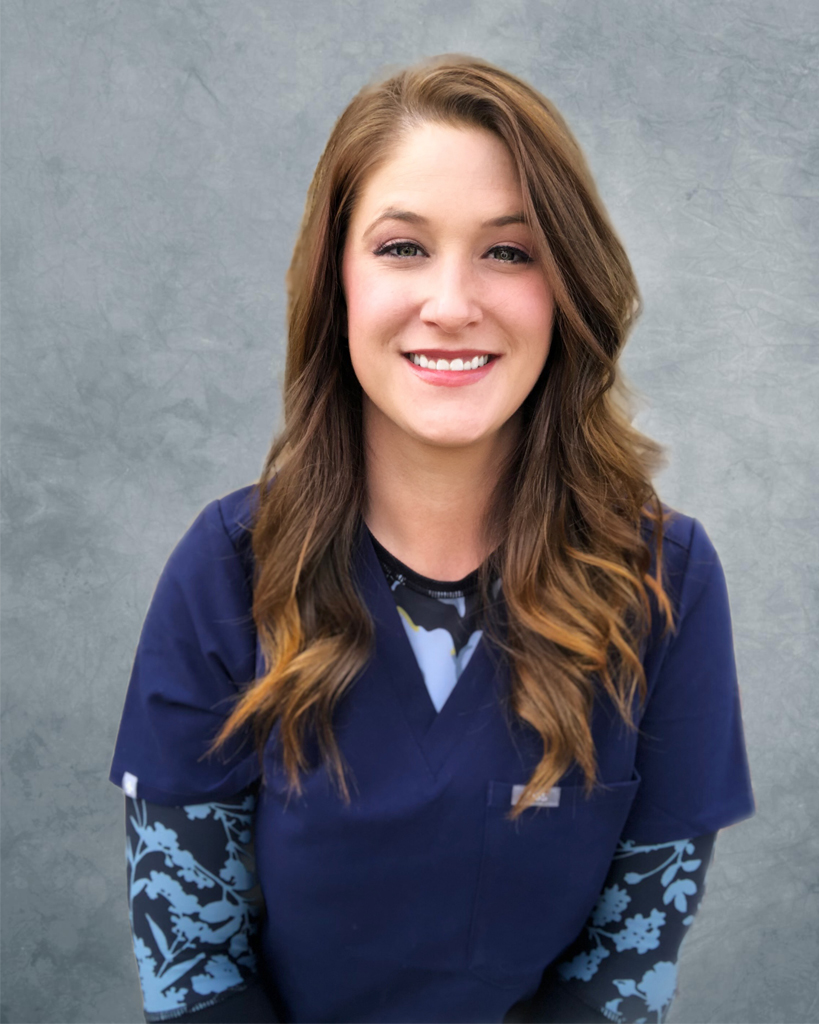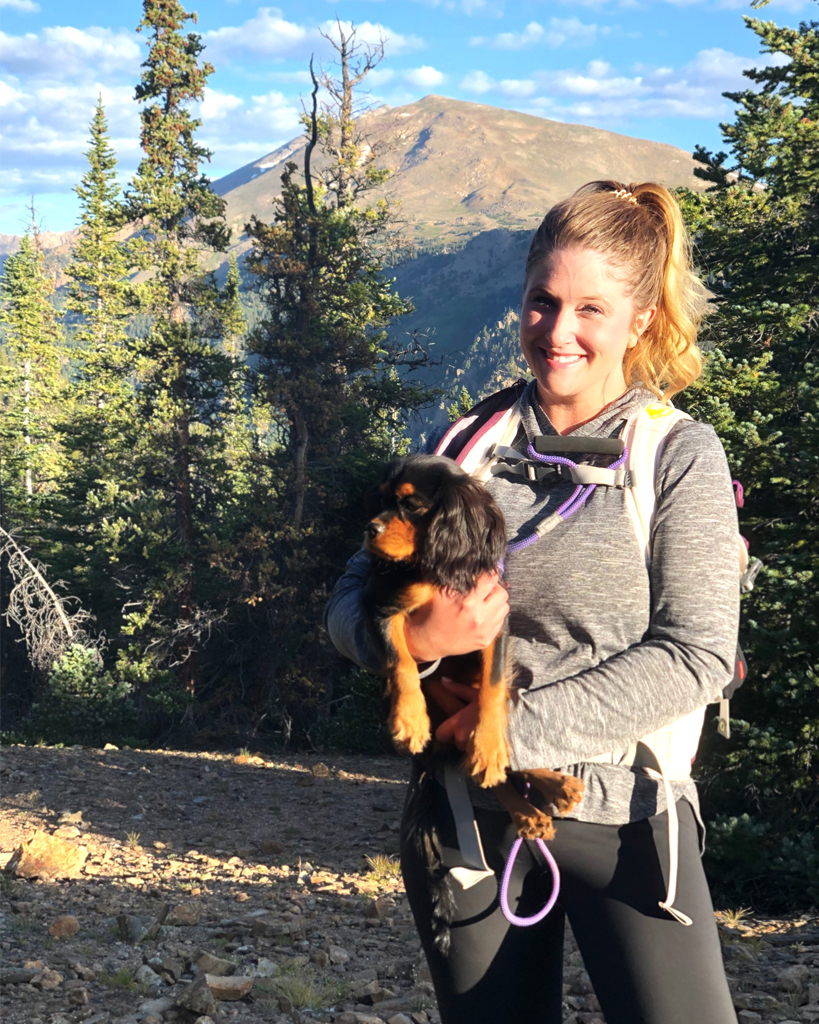

SANDRA PHILLIPS
ICU Nurse, Denver, Colorado

What was your involvement in the MSC?
I spent all four of my years at Texas A&M with MSC Fish. I joined MSC Fish as an incoming freshman, participated as a Big Sib for two years, and then served as the Service Committee Executive Director and leader of the Big Sib program.
What does a day in your life look like currently?
A day in my life has changed dramatically just in the last two months. When I get ready for my shift, infection control is laced in every decision: scrubs that are antimicrobial and water-resistant; my face is free of foundation to keep my PPE clean; my hair is pulled back and tucked into a scrub cap; my wrist is free of the watch I’ve worn to the hospital for 7 years; and my phone is in a Ziploc bag where it will remain for the next 14 hours. Then I leave through the garage to get my nursing shoes and hospital badge. I definitely don’t bring them into my home anymore.
I don’t listen to music or podcasts on my drive anymore, as my commute is now the time where I steel myself. Sometimes, it’s quiet and that is welcome, because the rest of my night shift will not be. Sometimes, it’s a phone call to my parents, because the version of me that they see is tougher than what I feel. Either way, it’s 30 minutes before I’m back in the fray.
When I get to the unit, I get my assignment which is now twice the patient-load that it used to be. I get report and learn that all 4 patients are “real” ICU patients (ex: on ventilators, have multiple titratable drips, are manually proned, or seem unstable enough to require intubation before too long).
I introduce myself to whichever Clinic/PACU/MedSurg/OR/PEDI/L&D nurse has been floated to the ICU (God Bless Them) and assigned to me for the duration of my shift. I outline how they can help me get through the next 12 hours. This is a different nurse every day, so it’s also a different conversation every day, depending on each nurse’s skillset. I find a fully-charged battery for my PAPR Hood, which I will wear for most of the shift, and we don the rest of our PPE like our lives depend on it. And they do.
We dig into our work. The patients who are alert appreciate I don’t wear a surgical mask under my PAPR Hood, because they can see my smile. The first time I wore a PAPR Hood without a surgical mask into a patient’s room, it was an accident. My patient looked shocked when he saw me. Then he smiled and I could see his eyes fill. It occurred to me he hadn’t seen a face or a smile in weeks. I marvel at the little things we used to take for granted. I stayed and talked to him longer than I normally would, because I missed human interaction as much as he did. He asked if I have had COVID-19… I said, “Not yet.” He asked if I was scared of getting it… I said, “The only thing I’m scared of, is contracting the virus and then having to be your roommate because we are all out of space at this hospital.” He laughed, and it felt good to both of us. Humor was the thing that kept me from telling him about my history of pneumonia, and that I was scared. Now, I intentionally leave the surgical mask off, since it offers no additional safety to me. My patients can see my face and we connect better when we can see each other’s faces.
The patients who are on ventilators are difficult to sedate, difficult to stabilize, and difficult to wean. We do the best we can, thinking inside and outside the box. As a care team, we are navigating this new terrain without a map. When we are not with our patients, we talk about what new information we have read about COVID-19, which therapies seem to yield positive results, and what are the best practices (of today, anyways). We are learning new things all the time, getting better at our jobs and hope patient outcomes will improve every day.
I check in with the patient’s family to give them detailed updates, because it’s now too dangerous for them to visit the hospital. These phone calls take hours, so they are usually over speakerphone while I am taking care of their family member in their room. For the first time in my 7 years of nursing, families seem to understand how difficult this job is for us, and they are surprisingly calm and patient on the phone. If someone told me I couldn’t visit my dad in the hospital, I would want to tear down the walls. So I thank them for their patience, they thank me for my care, and I work to make sure their family member does not feel so alone.
By the end of the shift, I am tired, my body aches, and I struggle to find my words in report. The oncoming nurse is always understanding because we have never been pushed like this. I have done everything I can do for my patients and I pass the responsibility into hands that I trust. I clean my equipment. I thank my team. Then I go home to unwind, see the dogs, and get some sleep. I will be back again tomorrow.
The MSC helps build leaders by providing opportunities to improve skills such as critical thinking, active listening, giving and receiving feedback, and others. What skills did you gain in your involvement with the MSC and how did your time as a student leader prepare you for your role during this challenging and unforeseen time?
I look back on events, projects, and programs I was involved in planning for MSC Fish, and the ones that offered me the most growth were the ones that didn't go well. They shine a light on areas that required improvement and those are experiences I still draw on today. I walked away from my time at Texas A&M with an increased ability to recognize when something is/isn't working and a willingness to adjust my plans accordingly.
If you were to return to your time in the MSC, what skills would you personally focus on strengthening, especially in your current situation?
If I could go back to my time in the MSC, I would spend more time strengthening my ability to listen to my peers and my willingness to receive feedback.
The MSC core values are Respect, Excellence, Leadership, Loyalty, Integrity, Service and Diversity. What core value best describes the work you do today?
Leadership is the core value that best represents my work on the frontline. I chose to be an ICU Nurse, but I did not get to choose the circumstances we are in. We all watched this virus make its’ way around the globe, but before it reached my city, I was not prepared for how it would affect my time with my family, the economy I live and work within, or my own health and well-being. No one would choose this version of the world we live in, and yet here we are. The only thing that I still have control over, is who I’m going to be in these circumstances. I don’t always know what the 10 steps in front of me should be, but I always know what the next right/intelligent/precise/lovely/compassionate/prudent (whatever you want to call it) thing to do is. Doing that, keeps you from being overwhelmed in a situation you can’t control. This version of leadership is the most important thing I can contribute right now. Coworkers notice and they can easily adopt it in their practice, and this is how we gain momentum.
What is one of your favorite memories from being involved in the MSC?
Anytime I had to wear a costume was always a fun night! My absolute favorite memory is running around campus in a safari truck made out of cardboard with my Service Assistant Directors dressed as animals.

